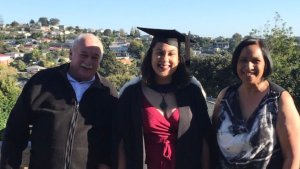Samantha’s Story
Samantha’s Story

Samantha with her parents, Richard and Ngahirata Gardner
One of the biggest mistakes I’ve made in my young adult life has been to assume Bowel Cancer isn’t something I needed to worry about.
I spent most of my early twenties not making it my business to learn anything about the disease, and I think I might’ve known one lady who had it, that she pooped in a bag, but I didn’t understand why she did or the gravity of what she had survived.
That was until late April 2018, when my Dad, Richard Gardner, landed in the emergency department of our local hospital with arrhythmia.
His organs weren’t working as they were supposed to, doctors wanted to know why, and a CT scan gave them that answer – revealing abnormalities in his liver.
We as his family were told these were consistent with secondary liver cancer and, it was assumed at the time, primary colon cancer.
This was the first time “Bowel Cancer” meant anything to me.
My reaction to the news was as expected. I was scared, I cried, and hearing the diagnosis of any kind of cancer was my idea of the absolute worst-case scenario. Still, the hopeless optimist in me, coupled with a lack of education or awareness around the killer disease, thought “I guess that’s one of the nicer ones… as far as cancers go”.
Less than four weeks on from that initial diagnosis, a time that was filled with a spate of failings from GPs and the District Health Board to give any formal diagnosis or clear answers, and Dad died.
He died too strung out on morphine to even be able to speak, eat, walk, shower or go to the toilet for himself anymore – and yet we all still held onto hope there would be some type of treatment or cure for his cancer as we had all been led on to believe.
It was a bitter and undignified end, and one I’ve now learned, thousands of other families go through every year too.
I now know Bowel Cancer is serious.
It is one of the most ugly and unforgiving diseases I’ve ever seen in my life. It claims thousands of lives, some faster than a blink, and yet if caught early it can be cured easily.
Two years on from Dad’s battle with Bowel Cancer, and that’s the hardest thing to come to terms with; knowing if things went a little differently, if he saw that doctor earlier, if he got to have that early screening… there could’ve been a chance, or at least, more time.
If you’ve ever lost someone to Bowel Cancer you’ll know how hard it is to stay in that mindset, dwelling on how things could’ve or should’ve gone.
So instead over the last two years, I’ve tried to put my time and energy into figuring out what Dad’s battle taught me, and the biggest thing I’ve learned is this: silence is a bigger killer than bowel cancer itself.
We can all play a role in changing that though, and it starts by speaking up, asking the hard questions, and refusing to avoid the awkward stuff.
Start by learning the signs and symptoms of Bowel Cancer; be honest and proactive about your health; support our men, who are over represented in Bowel Cancer fatalities, to do the same; and lastly, get behind advocacy services like Bowel Cancer New Zealand.
This organisation is putting in awesome mahi to reduce the impact of Bowel Cancer through supporting those living with it and their families; educating communities and raising awareness of bowel cancer symptoms; advocating for nationwide screening; and funding research into treatments, and ultimately, a cure.
And they rely on the good will of others to carry out that work.
No one deserves to die of Bowel Cancer. Everyone deserves time, dignity and hope – and we can all help with this, by taking small steps towards change.
Ahakoa he iti he pounamu. Although it is small, it is precious.


